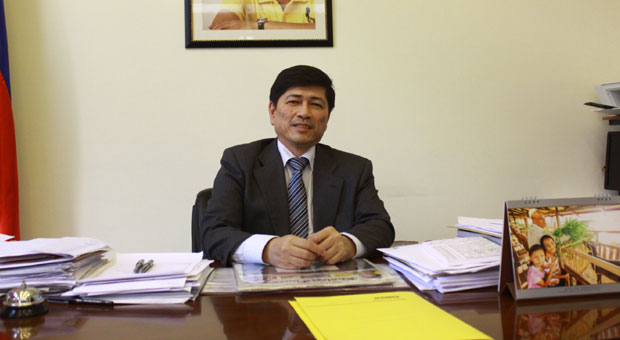Improve legal mechanisms instead of imposing forced remittance – consul general

Dubai Consul General Frank Cimafranca does not see the need for a bill that will require OFWs to remit a portion of their earnings to their family or relatives back in the Philippines. PHOTO/ MATIKAS SANTOS, INQUIRER.net
SHARJAH, United Arab Emirates – A pending “forced remittance” bill at the House of Representatives is unnecessary and runs the risk of affecting the majority of Overseas Filipino Workers (OFWs) who are diligent in supporting their relatives and families back in the Philippines.
“If [the bill] intends to force OFWs to support their families back home, then I think [it’s better] to just come up with a legal mechanism; we already have civil laws that provide for this, maybe make it easier for families to go to court and let the court compel [the negligent OFW],” Dubai Consul General Frank Cimafranca said in an exclusive interview with INQUIRER.net.
“If the target is those rogue parents or husbands who are not sending home money to support their families, they are very few, and they are the exception rather than the rule,” he said.
Last March 5, international migrant workers group Migrante International condemned House Bill (HB) 3576 filed by OFW Representative Roy Señeres, saying it was a resurrected version of former president Ferdinand Marcos’ “forced remittance law” or Executive Order 857.
“It was precisely the previous forced remittance law that further drove OFWs in deeper debt. It gave rise to the proliferation of loansharks and lending institutions that fed on the desperation of OFWs,” Connie Bragas-Regalado, chairperson of Migrante Sectoral Party, said in their statement.
Section 1 of HB 3576 states that “OFWs, whether land-based or sea-based, are required to remit regularly a portion of their foreign exchange earnings to their family or legal dependent recipient in the Philippines.”
If a Complaint for Support has been filed by an OFW’s dependent, “Ambassadors, Consul Generals, Chiefs of Mission, or Charge d’ Affaires are authorized to withhold the renewal or approval of the passport of an erring OFW unless proof of compliance of the remittance requirement of his financial support is submitted,” the bill states.
The requirements needed as proof can be any of the following: a) Confirmed bank (foreign) remittance receipt. b) Receipt of International Postal Money Order. and c) A sworn statement from the dependent that said support has already been satisfied and/or settled.
Señeres said in the explanatory note of the bill that there have been many reports of OFWs neglecting or abandoning their families back in the Philippines.
“There have been reports of families or dependents of OFWs who have complained of the failure of the OFW relatives to send support to them,” Señeres said.
“This is particularly true for many families of land-based OFWs since there is no law or rules and regulations which require them to remit a portion of their foreign exchange earnings to their families in the Philippines,” he said.
Cimafranca said that the previous forced remittance law imposed by Marcos was due to the country’s problems with foreign exchange reserves which was then nearly depleted.
“When it was imposed before there was a reason, there was necessity of doing so because we needed foreign exchange reserves. But now we already have so much foreign exchange reserves,” Cimafranca said.
The economic situation that the country was facing before is no longer present “so there really is no need to impose that kind of a requirement of mandatory remittance,” he said.
There are 931,562 permanent, temporary, and irregular Filipinos in the UAE as of December 2012 putting in third on the list of countries with the most OFWs, according to the records of the Commission on Filipinos Overseas (CFO) posted online.
UAE ranks second when it comes to deployment of OFWs with 259,546 new hires and rehires in 2012, according to data from the Philippine Overseas Employment Administration (POEA) website.
Saudi Arabia is the top OFW deployment destination with 330,040 in 2012.
The around 10.5 million Filipinos all over the world remitted more than $21.4 billion in 2012, according to the records of the Bangko Sentral ng Pilipinas.
The figure has steadily risen through the previous years with $20.1 billion in 2011 and $18.7 billion in 2010.
RELATED STORY
Forced remittance bill smacks of Marcosian law – Migrante














